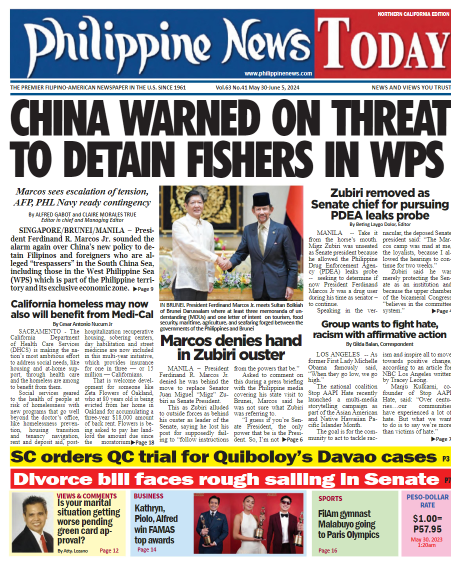MANILA – The Philippine Coast Guard (PCG) rebuked the China Coast Guard (CCG) for accusing Manila of violating its so-called sovereignty in the South China Sea to justify its water cannoning of two local vessels off Zambales.
The Bureau of Fisheries and Aquatic Resources (BFAR) deployed four ships to supply fuel and goods to Filipinos fishing near the Bajo de Masinloc or Scarborough Shoal on Friday.
Two of the BFAR vessels, BRP Datu Tamblot and BRP Datu Taradapit, were water cannoned by CCG vessels 4203 and 3105, some 15.6 nautical miles (NM) and 18.1 NM off the feature.
Later, the United States (US), Japan and other countries expressed concern over China Coast Guard’s (CCG) action against vessels of the Bureau of Fisheries and Aquatic Resources (BFAR) near Bajo de Masinloc.
“The United States stands with the Philippines in upholding freedom of navigation and condemning the China Coast Guard’s dangerous actions that disrupted a lawful Philippine mission to provide supplies to fisherfolk within the Philippine EEZ (exclusive economic zone),” the US Embassy in Manila said in a statement.
Japanese Ambassador to the Philippines Endo Kazuya stressed that Tokyo opposes any unilateral attempts to change the status quo through force or coercion.
“We oppose any unilateral change… as well as any actions that increase tensions in the South China Sea. We are concerned about the repeated harassment and actions involving the use of water cannons. We would like to stress the importance of respecting the UNCLOS [United Nations Convention on the Law of the Sea] and the 2016 arbitral award,” Endo said during the reception for the 71st Anniversary of the Japan Self-Defense Forces (JSDF) aboard the JS Ise in Manila.
Endo noted that the South China Sea (SCS) issue is directly related to the peace and stability of the Indo-Pacific region, and is a legitimate concern of the international community.
The ambassador added that Japan stands in solidarity with the Philippines in advancing the vision of a free and open Indo-Pacific.
“The Philippines is an important strategic partner of Japan for peace and stability in the region, as it is a maritime nation and a neighbor that shares sea lanes with Japan and faces similar strategic challenges at sea,” Endo said.
He went on, “We recognize that the principles of freedom of navigation, adherence to international law, and respect for sovereignty are essential to the continued prosperity and security of our peoples.”
The incident occurred on June 20 within the country’s EEZ in the South China Sea, where BFAR Region 6 (Western Visayas) vessels were delivering support to traditional fishing communities.
According to the National Maritime Council, the CCG’s attack was unprovoked and harmful –endangering civilian personnel and damaging equipment.
Under the Mutual Defense Treaty, the US reiterated its commitment to defending the Philippines.
It also underscored the importance of maintaining peace and stability in the Indo-Pacific region.
This latest development adds to growing international concern over China’s increasingly aggressive behavior in the South China Sea and the risk it poses to regional security and maritime safety.



















